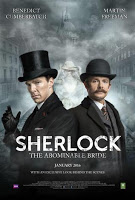The New Year’s special of Sherlock, The Abominable Bride ($11-$15 on Amazon) is… well, okay. Keep in mind that if you’re waiting for Amazon instead of broadcast, you’ve got to wait until the 7th, because…. reasons? (Dammit BBC, you’d think you’d learn.)
That said, it has some really good lines in it, and the first hour was pretty compelling1. But the third act… well, Cat Valente and I had a brief exchange on Twitter that sums it up.
Again, it’s not bad by any stretch of the imagination. Cumberbatch is, well, delightfully Cumberbatchian. Mrs. Hudson gets a few good lines, and the plot (again, at least in the first two acts) highlights exactly how overlooked and misused women are.
But the resolution of the story once again swivels the spotlight off the women and squarely onto not just Sherlock, but he, John Watson, and Moriarty. The shift in focus to the male characters once the “aren’t we clever” twist is revealed is jarring, especially since we finally had meaningful female characters on this show. (Mary Watson doesn’t count, for reasons I talk about here: https://ideatrash.net/2014/02/why-donna-noble-is-stronger-than-mary.html)
And the twist itself – after the initial “Oh, that is clever” reaction that it warrants – is then repeatedly shoved at you in a manner that is, I presume, intended to disorient. This isn’t inherently bad either; but when we reach the conclusion, we’re to believe that Sherlock has gotten it all straight and clear… while we, the audience, are left with many many questions about what is real and what isn’t unanswered, and perhaps, unanswerable.
The thing that always annoyed me about the original Holmes stories was the way that Sherlock would have information that you did not. And while there are plenty of hints that Sherlock’s friends think he’s an unreliable narrator2, we as the audience are clearly meant to still trust in this not-a-hero.
I understand that it’s difficult to write a super-intelligent character. It’s fiendishly hard to have a character solve a mystery before the reader/audience while still providing all the information.
But that possibility – that we get all the same information, but do not correctly deduce, do not observe well enough – is what makes the detective elements of Sherlock Holmes compelling.
Simply being confusing and vague in order to seem intelligent is David Lynch’s territory. With Twin Peaks coming back, there’s no need for Moffat and Gatiss to use that formula as well.
1 Gatiss in a fat suit, however, was not.
2 Now, if Gatiss and Moffatt actually followed that and had Sherlock become an unreliable narrator due to his egotism and drug use, and led us as audience down that path… well, that would be interesting.
